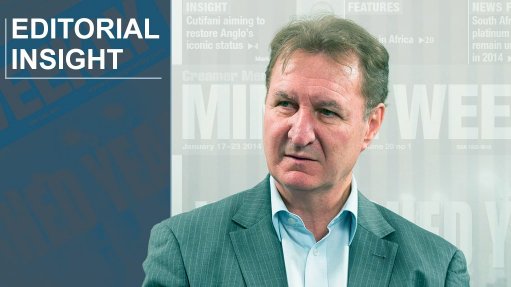
Anglo American Platinum (Amplats) has done well to detail the use of platinum-group metals (PGMs) in hybrid electric vehicles. It also did well to set the scene around the looming competition between battery electric vehicles, which do not use PGMs, and fuel cell electric vehicles, which do. The elaboration by Amplats CEO Chris Griffith at last week’s presentation was made in response to Mining Weekly’s interrogation of the company’s revelation that PGM loading in hybrid electric vehicles is currently higher than in conventional vehicles. As it turns out, PGMs prospects continue to be good in all aspects of the automotive market other than in lithium-using battery electric vehicles. In numerical terms, platinum-using diesel vehicles will still be up, the large petrol vehicle segment will continue to draw on palladium, the exhaust systems of hybrids will continue to provide demand with the cooler environment boosting PGM loading, and platinum-dependent fuel cell electric vehicles are likely to compete with battery electric vehicles in the same way as petrol and diesel vehicles compete currently. There are already 140 hydrogen refuelling stations in the world for fuel cell electric cars, another 40 are in development and 2 000 are planned over the next ten years, which all point to rising PGM demand from Southern Africa’s mines.
The way mining giants have over-produced in the iron-ore mining arena cries out for vigorous criticism. Companies like Rio Tinto and BHP Billiton of Australia and Vale of Brazil are censured at every global forum for the reckless laceration of the global iron-ore market. Last week’s Kumba Iron Ore interim results presentation drove home the devil-may-care ruthlessness of the iron-ore mining giants. And it is still not over. Incorrigible Brazil is still at it with the upcoming S11D project and Australia with Roy Hill. Cliffs Natural Resources CE Laurenco Goncalves was correct to tongue-lash Rio and BHP at the Global Iron Ore Conference, in Perth. The direct South African result has been a loss of 2 400 direct jobs at Kumba Iron Ore, representing a 31% cut in employee numbers. Going forward, the new supply on the way could knock the iron-ore price below $50/t once more as the full weight of additional 100-million-tonne-plus Australian and Brazilian supply uptick hits a shrinking steel market.
Sadly, the United Nations Conference on Trade and Development (Unctad) has damaged its credibility by incorrectly stating that South Africa’s gold and iron-ore exports are being grossly underinvoiced. Unctad should be called to account for being the source of prominent international news reports alleging that between 2000 and 2014, 67% of South Africa’s gold exports worth $78.2-billion were underinvoiced. In the same period, Unctad alleged that $3-billion worth of South African iron-ore exports to China were underinvoiced. It is little wonder that the Chamber of Mines of South Africa, on page 8 of this edition of Mining Weekly, takes umbrage with Unctad’s dataset, which it found to have “significant gaps and errors”. The right thing for Unctad to do is to put out a correction.